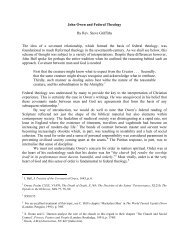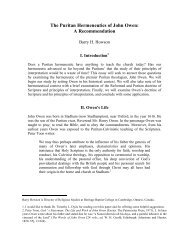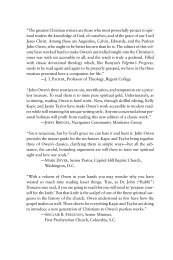M.TH. LONG DISSERTATION (LD6.1) - John Owen
M.TH. LONG DISSERTATION (LD6.1) - John Owen
M.TH. LONG DISSERTATION (LD6.1) - John Owen
Create successful ePaper yourself
Turn your PDF publications into a flip-book with our unique Google optimized e-Paper software.
<strong>John</strong> <strong>Owen</strong>’s Theological Context<br />
The doctrine of eternal justification appears to have been limited to certain<br />
English and Dutch Reformed divines of the seventeenth century. Nevertheless, it was<br />
not confined to those on the extreme fringes of Protestant theology. 80 The doctrine was<br />
popularised in England in the 1640s by Tobias Crisp, <strong>John</strong> Eaton, and <strong>John</strong> Saltmarsh. 81<br />
The primary concerns of adherents to the doctrine were to magnify the freeness of God’s<br />
grace, 82 and to assure those who doubted their justification. 83 Put simply, eternal<br />
justification is the view that God not only chose the elect in eternity, he also justified<br />
them in eternity.<br />
As in the standard Reformed definition, those who held to eternal justification<br />
argued that the ground of justification is the obedience and suffering of Christ, which is<br />
imputed to the elect, their sins being imputed to him. 84 Thus, in both views, Christ alone<br />
justifies. However, exponents of eternal justification argued that the mainstream<br />
Reformed divines could not consistently maintain that Christ alone justifies because of<br />
the place they accorded to faith. For example, Crisp argued that, were faith required as<br />
the instrument by which justification is appropriated, then Christ would not justify alone:<br />
‘Is faith Christ himself? If not, then Christ must have a partner to justifie, or else Faith<br />
doth not justifie, but Christ alone doth it. Nay, I say more, Christ doth justifie a person<br />
before he doth believe.’ 85<br />
For Crisp, the New Covenant is different from other biblical covenants because<br />
the others all have stipulations, conditions on both sides. However, on humanity’s side,<br />
80 Trueman 1998a: 28. On eternal justification, see Boersma 1993: 66-135; Packer 2003: 248-251; Trueman<br />
1998a: 28, 207-210; Representative exponents include Tobias Crisp, <strong>John</strong> Eaton, <strong>John</strong> Saltmarsh, and<br />
William Twisse.<br />
81 Eaton 1642; Saltmarsh 1646; 1647; Crisp 1690 [first published 1643]; cf. Packer 2003: 248.<br />
82 Hence the title of Saltmarsh 1646; see also Crisp 1690: 93-95.<br />
83 Crisp 1690: 431; Saltmarsh 1646: 91ff.<br />
84 Saltmarsh 1646: 143.<br />
85 Crisp 1690: 85.<br />
27





